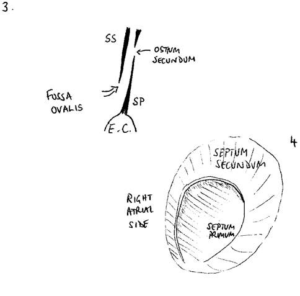A Patent Foramen Ovale (PFO) is a small flap-like opening between the heart’s upper chambers, typically closing soon after birth. However, around 25% of the population retains this opening. It usually has no implications for health and is NOT a hole in the heart.
A PFO can potentially cause health complications, including stroke.
Most PFOs do NOT cause any symptoms. Symptoms of Patent Foramen Ovale, or PFO symptoms, can be subtle but may include:
- Unexplained strokes
- Decompression sickness for divers
- Migraine headaches
- Irregular heartbeat
The link between PFO and stroke is significant in young patients who have experienced a stroke without other apparent causes. Rare syndromes have been linked to PFO, including breathing issues.
What is a PFO?
A Patent Foramen Ovale is a remnant of fetal circulation. PFO allows blood to bypass the lungs before birth and usually closes shortly after. However, this doesn’t happen in some people and is considered a minor heart defect that can lead to potential complications with age, such as a higher risk of stroke due to blood clots forming and crossing the flap (paradoxical embolism).
The diagram below shows the PFO flap in cross-section and from the right side:
PFO Closure Procedure
If a cardiologist recommends this treatment plan, a private PFO closure can be performed using a small, umbrella-like closure device. The procedure involves passing a catheter through the leg (groin) vein back to the heart to close the opening, guided through a blood vessel by imaging tools like X-rays and ultrasound waves. Despite the risk of possible complications, it is a much less invasive procedure than open heart surgery.
If you’re experiencing PFO symptoms or are concerned about your heart health, contact our office to book a consultation to explore your treatment options.
Or watch PFO closure explained done at One Welbeck
Article by Dr Malik, a leading UK cardiologist. He works at One Welbeck Heart Health – London’s Largest Private Cardiology Group, and at Hammersmith Hospital, Imperial College Healthcare NHS Trust, London, one of the largest NHS Trusts in the UK.



